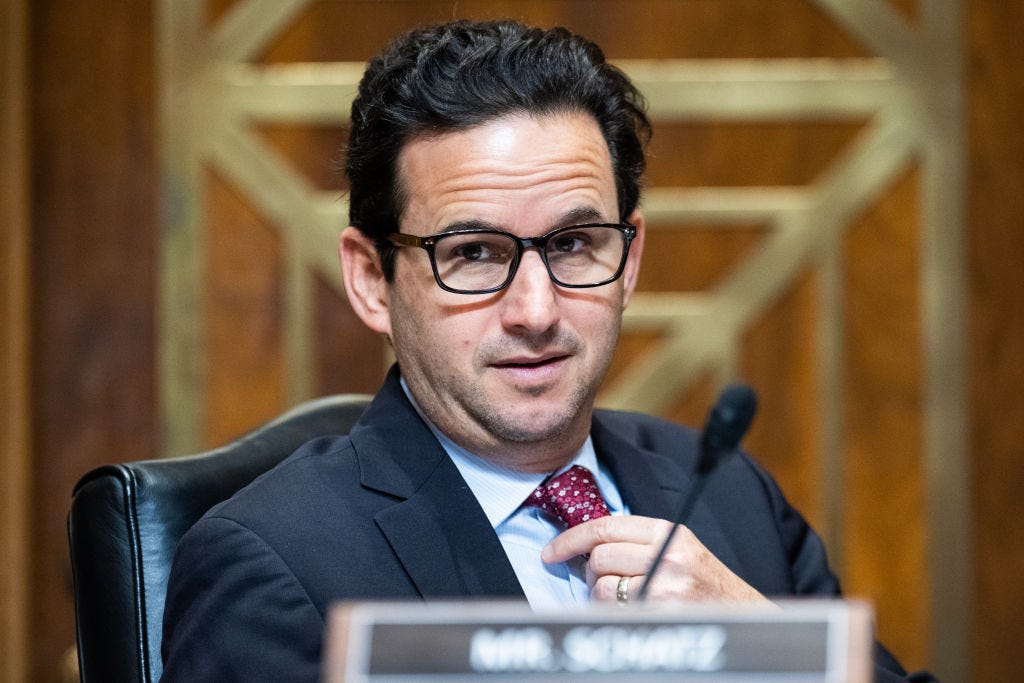Should the U.S. stop sending Israel bombs? “It is the next question,” a Democratic senator says
Brian Schatz on what comes after his colleague Chuck Schumer’s attack on Netanyahu, Jewish grappling over the war, Mitch McConnell’s legacy, nihilism on the left, and how artists can help beat fascism
Senator Brian Schatz of Hawaii has established himself as one of the most progressive members of the Senate, but he’s also built a reputation as a pragmatic politician, someone who’s able to act as an honest broker between the left and centrist wings of the Democratic coalition. “The coalition we have,” he has said, “has people who basically want nothing to change and people who want everything to change.”
We gave him a call this week to talk about Israel and Gaza — and then much else.
We talked about Senate Majority Leader Chuck Schumer’s provocative speech this week (in which Schumer, a staunch Israel ally, called Prime Minister Benjamin Netanyahu an obstacle to peace and called for new elections), and what it might mean to follow Schumer’s remarks to their logical end. “It is hard to defend sending bombs and then sending food aid to follow up,” Schatz admitted to us. He also talked about his own and his fellow Jews’ inner struggle over the war, the self-defeating nihilism of parts of the online left, his take on departing Republican Senate Minority Leader Mitch McConnell, and why he’s not worried about Joe Biden’s age anymore.
A request for those who haven’t yet joined us: The interviews and essays that we share here take research and editing and much more. We work hard, and we are eager to bring on more writers, more voices. But we need your help to keep this going. Join us today to support the kind of independent media you want to exist.
And today we’re offering you a very rare discount of 20 percent if you become a paying subscriber. You will lock in this lower price forever if you join us now!
I was looking at your reaction to Chuck Schumer's speech this week. You called it “gutsy” and “historic.” Why was it gutsy, why was it historic, and why did it matter?
Chuck is the highest-ranking Jewish-American in the history of our country. He's a person who loves Israel in his bones. He and I have disagreed about Israel stuff since I got here. He was a hard sell on the Iran nuclear deal and just down the line, he's been considered an Israel hawk, and he's also the leader of the Senate Democrats. And so when he weighs in on a thing like this, he understands what it means and how much of a potential inflection point it is.
I know he's been thinking about this for a couple of months now. I didn't know what he was going to say, but I knew that he was planning to deliver some tough love. And that's what this is. If you love Israel, you have to try to forge a path forward for peace and stability and prosperity for two peoples. After several decades of working with and against and observing Prime Minister Netanyahu, Chuck has come to the conclusion that Netanyahu is no longer capable of leading Israel to a better future.
The thing he called for specifically had to do with Israel’s elections and their democratic process. But the place where he has more power, where you have more power, is of course American policy around sending weapons, around aid. Do you think this kind of speech, though it is a breakthrough from a rhetorical point of view, should be matched by a dramatic reconsideration of how aid works, how weapons shipments work, whether there are conditionalities on help or not?
I would dispute the premise here. I don't think that requiring that weapons are used consistent with our laws and with international law and with our values is a radical departure from United States foreign policy. It is only in the memorandum of understanding between the United States and Israel that defines the annual defense commitment that the language about “no conditions” exists.
Whenever we do appropriations, whether it's domestic or defense, we have conditions on the expenditure of those funds. This idea that you put conditions on the resources we provide a small non-profit in the state of Hawaii, but not on those we provide to a defense force in the middle of a hot war, just defies common sense.
More fundamentally, if you follow Schumer’s speech to its logical conclusion, should we be sending weapons to the country he described under the government he described?




